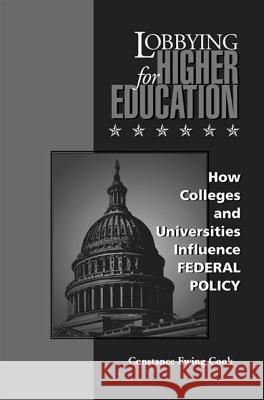Lobbying for Higher Education: History, Representation, Ethics » książka
Lobbying for Higher Education: History, Representation, Ethics
ISBN-13: 9780826513175 / Angielski / Miękka / 1998 / 272 str.
Historically, many faculty and administrators in higher education have regarded themselves as above the fray--part of the national interest, not a special interest--and considered lobbying a dirty business unworthy of their lofty enterprise. Now that academia no longer enjoys all the respect and good will that federal policy makers once afforded it, that attitude has changed. The Republican sweep of the 1994 Congressional elections served as a wake-up call for the higher education community. In response, it made a spirited effort to gain attention for its own policy preferences.
Lobbying for Higher Education is about how the major higher education associations and the constituent American colleges and universities try to influence federal policy, especially congressional policy. In clear prose Cook explains how the higher education community organizes itself in Washington, how it lobbies, and how its major interest groups are perceived both by their own members and by public officials. The book focuses on the crucial development in 1995-1996 of a new lobbying paradigm, which included the greater use of campus-based resources and ad hoc coalitions. The most engrossing part of its story is higher education's creative response to the policy turmoil and disruption of the status quo that resulted from the shift in congressional party control.
The author, Constance Cook, uses sources unique to this project: over 1,500 survey responses from college and university presidents (a 62% return rate) and nearly 150 interviews with institutional and association leaders. Fortuitously, the 1994 electoral upheaval provided her with an opportunity to capture, analyze, and interpret the responses of her subjects in a period of unusually sweeping change.
Lobbying for Higher Education is a timely book with an interesting and important story at its core.











